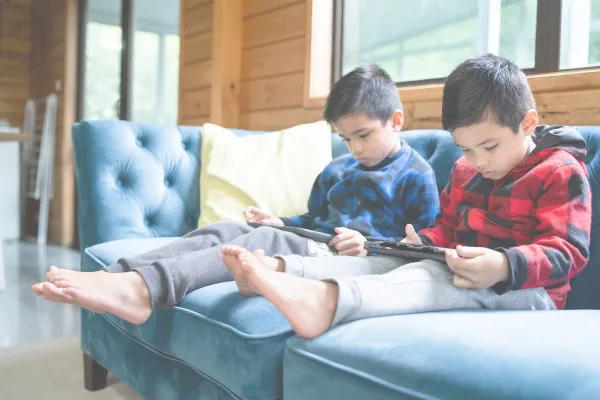
Parenting Blogs
Join us on this incredible journey of parenthood, where the
threads of love, laughter, and learning are woven into the fabric of family
life. Whether you're a first-time parent seeking guidance or a seasoned, our
parenting blog is a place where the shared adventure of raising children takes
centre stage.

Screen Time Strategies: Balancing Technology Use in a Digital Age
"Balance is not something you find, it's something you create."
In today’s digital age, technology is an integral part of our lives. From educational tools and virtual playdates to entertainment and social connections, screens have become ubiquitous. For parents, this presents a unique challenge: how do we balance the benefits of technology with its potential drawbacks? Here are some evidence-based strategies to help families manage screen time effectively and foster a healthy relationship with technology.

Understanding the Impact of Screen Time
The first step in managing screen time is understanding its potential effects. While technology can be a powerful educational tool, excessive screen time has been linked to issues such as:
Sleep disturbances: Blue light from screens can interfere with melatonin production, disrupting sleep patterns.
Behavioural challenges: Overuse of screens can lead to difficulties with attention, mood regulation, and social interactions.
Physical health concerns: Prolonged screen time often reduces physical activity, contributing to obesity and posture problems.
Emotional well-being: Excessive exposure to social media may increase feelings of inadequacy or anxiety, especially in adolescents.
Set Clear Boundaries
Create Screen-Free Zones: Designate areas in your home where screens are not allowed, such as bedrooms and dining areas. This encourages family interaction and promotes better sleep hygiene.
Establish Time Limits: Use tools like parental controls or timers to enforce daily screen time limits tailored to your child’s age. The Australian Department of Health recommends:
No screen time for children under 2 years of age.
Up to 1 hour per day for children aged 2 to 5 years.
For children aged 5 to 17 years, no more than 2 hours of recreational screen time per day, not including schoolwork.
Model Healthy Habits: Children often mimic their parents’ behaviour. Set an example by practising mindful technology use and prioritising offline activities.
Prioritise Quality Over Quantity
Not all screen time is created equal. Focus on:
Educational Content: Encourage apps, games, and shows that promote learning and creativity.
Interactive Activities: Opt for screen-based activities that involve active participation, such as coding programs or virtual art classes.
Co-Viewing: Watch or play together with your child to guide their understanding and foster family bonding.
Encourage Alternative Activities
Balancing screen time is easier when children have engaging offline options. Consider:
Outdoor Play: Encourage physical activities like biking, hiking, or team sports.
Creative Pursuits: Provide materials for drawing, crafting, or building.
Reading: Introduce a mix of books and audiobooks to foster a love for storytelling.
Teach Digital Literacy
As children grow, teaching them to navigate the digital world responsibly becomes crucial. Key topics to address include:
Online Safety: Discuss privacy settings, the importance of guarding personal information, and recognising potential online dangers.
Critical Thinking: Help your child discern reliable information and avoid misinformation.
Healthy Communication: Teach respectful online behaviour and the importance of kindness in digital interactions.
Regular Check-Ins
Schedule ongoing discussions with your child about their screen time habits and experiences. Questions to ask might include:
What are your favourite online activities?
Have you encountered anything online that made you uncomfortable?
How do you feel after spending time on screens versus doing other activities?
Flexibility and Balance
Every family is unique, and rigid rules may not suit all circumstances. Be flexible and adapt your screen time strategies as your child’s needs and interests evolve. During school holidays, for example, you might allow more screen time but balance it with structured offline activities.

Leverage Technology Wisely
Finally, use technology to your advantage. Many devices and platforms offer tools to monitor and manage usage, such as:
Screen Time Reports: Track daily and weekly usage to identify patterns.
Parental Controls: Set restrictions on apps, websites, and content.
Focus Modes: Reduce distractions during homework or family time.
Conclusion
Balancing screen time in the digital age requires intentionality, communication, and adaptability. By setting clear boundaries, prioritising quality, and fostering alternative interests, parents can help children develop a healthy relationship with technology. Remember, the goal isn’t to eliminate screens but to use them as tools for learning, connection, and creativity while maintaining balance in all aspects of life.
If you would like to explore how to develop your parenting skills further, we'd love for you to book in a complimentary Discovery Session with us to chat about where you are now and where you would like to be, with a guarantee that you will know the next step you need to take to get there.
You can book in for your session with us here: https://bookwithcoachjanelle.as.me/discoverysession

